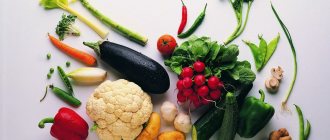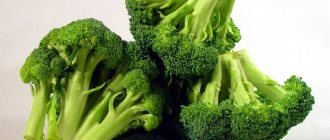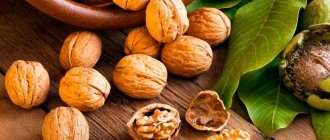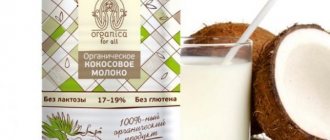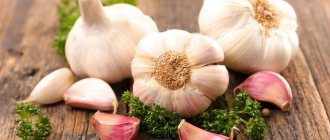Beneficial properties of broccoli
Speaking about the beneficial properties, one cannot fail to emphasize the record content of vitamin C per 100 grams - 89.2 mg, sodium per 100 grams - 33 mg, which affects the state of water-salt balance in the human body, and potassium (316 mg), which supports the functioning of the heart and nervous system. Broccoli also contains a whole range of vitamins, microelements and minerals such as: calcium, zinc, phosphorus, magnesium, manganese, sulfur, fiber, B1, B2, B5, B6, PP, E, K, provitamin A and is an excellent supplier of beta carotene.
Benefits and composition
Broccoli is an annual plant of the cabbage family. It differs from cauliflower in the dark green color of the heads, tightly collected in inflorescences. Sometimes broccoli can have a slightly purple tint.
Calorie content and composition
The energy value of 100 grams of raw broccoli is 34 kilocalories.
The calorie content of cabbage depends on the method of its preparation:
- boiled without salt - 27 kcal;
- boiled with salt - 29 kcal;
- steamed - 27 kcal;
- stewed - 37 kcal;
- fried - 47 kcal;
- cooked in the oven - 30 kcal;
- cooked in a slow cooker - 32 kcal.
The large number of calories in a fried dish is explained by the fact that during cooking the cabbage absorbs some of the oil.
Broccoli contains vitamins C and K, which are necessary for the functioning of connective and bone tissues. Broccoli holds the record among cabbage for vitamin A content.
BJU per 100 g of product:
| The nutritional value | Quantity |
| Squirrels | 2.8 g |
| Fats | 0.4 g |
| Carbohydrates | 7 g |
Chemical composition per 100 g of product:
| Element | Quantity |
| Vitamin A | 3.86 mcg |
| Vitamin C | 89.2 mg |
| Vitamin K | 1 mcg |
| Vitamin B6 | 0.2 mg |
| Vitamin B9 | 0.63 mcg |
| Vitamin D | 0.54 mg |
| Cholesterol | 0.1 mg |
| Potassium | 3.16 mg |
| Sodium | 33 mg |
| Calcium | 0.47 mg |
| Magnesium | 0.21 mg |
| Phosphorus | 0.66 mg |
| Iron | 0.0073 mg |
Benefits for the body
Broccoli has the following effects on the body:
| Impact | Explanation |
| Reducing the risk of heart attacks and strokes | Choline and methionine remove cholesterol from the body, preventing it from accumulating on the walls of blood vessels. Flavonoids and phenolic acids are essential for heart disease |
| Eliminate constipation | Thanks to the large amount of fiber - 2.6 g per 100 g of product - broccoli cleanses the intestines and normalizes its functioning |
| Normalization of blood sugar levels | Sulforaphane, contained in cabbage, quickly normalizes blood sugar levels. Thanks to flavonoids and phenolic acids, broccoli is indispensable for type 1 and type 2 diabetes |
| Restoration and strengthening of the nervous system | Due to its vitamin B1 content, broccoli is recommended for consumption by people suffering from mental disorders, as well as memory problems and excessive irritability. |
| Normalization of the gallbladder | Broccoli promotes the production of bile, normalizing the functioning of the gallbladder |
| Maintaining the body's defenses in the fight against viruses | Flavonoids and phenolic acids have antiviral effects |
| Reducing the risk of allergic reactions | Kaemferol helps cope with allergies and their consequences. Flavonoids and phenolic acids help cope with asthma |
| Preserving beauty and youth | Beta-carotene supports healthy nails, hair and skin |
Contraindications and harm
Vegetables should not be consumed raw or fried in the following cases:
- in case of individual intolerance to the product;
- if an allergic reaction occurs;
- with high acidity of gastric juice;
- while following a diet without coarse fiber.
It is enough to consume 150-200 g of product per day. If the norm is constantly exceeded and contraindications are ignored, the following harm to the body is possible:
- development of allergies and urticaria due to high vitamin A content;
- insomnia due to the action of B vitamins;
- imbalance of substances in the blood due to increased potassium levels;
- gastrointestinal disorders, since consuming fiber in large quantities irritates the stomach and disrupts the intestinal microflora.
It is not recommended to fry broccoli, since the frying process, especially over high heat and with the addition of large amounts of oil, produces carcinogens. They accumulate in the body, causing a person to experience allergic reactions.
It is not recommended to prepare broccoli decoctions, as they contain harmful substances - guanine and adenine. Oversaturation with them can cause disturbances in the functioning of the nervous system and skin problems in the body.
Calorie content of broccoli per 100 grams of product in various types
In the table of caloric content of broccoli per 100 grams of product, you can easily create a diet for yourself with this product. And understand in what form it is best for you to prepare it.
calorie content of boiled broccoli – 27 kcal/100 grams
calorie content of steamed broccoli – 27 kcal/100 grams
calorie content of broccoli puree soup – 85 kcal/100 grams
fried broccoli calorie content – 28 kcal/100 grams
broccoli in the oven calorie content – 80.5 kcal/100 grams
calorie content of broccoli with egg – 72.5 kcal/100 grams
broccoli with cheese calorie content – 164 kcal/100 grams
calorie content of baked broccoli – 23 kcal/100 grams
calorie content of frozen broccoli – 23 kcal/100 grams
broccoli in sour cream calorie content – 92.5 kcal/100 grams
calorie content of broccoli boiled with salt – 35 kcal/100 grams
fried broccoli calorie content – 28 kcal/100 grams
Stewed broccoli calorie content – 37 kcal/100 grams
calorie content of raw broccoli – 34 kcal/100 grams
steamed broccoli calorie content in a slow cooker – 28 kcal/100 grams
calorie content of fresh broccoli – 28 kcal/100 grams
We can say with complete confidence about the unconditional benefits of this plant on the human body.
Calories in steamed broccoli. Chemical composition and nutritional value.
Nutritional value and chemical composition of “steamed broccoli”.
The table shows the nutritional content (calories, proteins, fats, carbohydrates, vitamins and minerals) per 100 grams of edible portion.
| Nutrient | Quantity | Norm** | % of the norm in 100 g | % of the norm in 100 kcal | 100% normal |
| Calorie content | 28.33 kcal | 1684 kcal | 1.7% | 6% | 5944 g |
| Squirrels | 2.7 g | 76 g | 3.6% | 12.7% | 2815 g |
| Fats | 0.33 g | 56 g | 0.6% | 2.1% | 16970 g |
| Carbohydrates | 4.7 g | 219 g | 2.1% | 7.4% | 4660 g |
| Alimentary fiber | 3 g | 20 g | 15% | 52.9% | 667 g |
| Water | 90.72 g | 2273 g | 4% | 14.1% | 2506 g |
| Ash | 0.71 g | ~ | |||
| Vitamins | |||||
| Vitamin A, RE | 56 mcg | 900 mcg | 6.2% | 21.9% | 1607 g |
| alpha carotene | 15 mcg | ~ | |||
| beta carotene | 0.663 mg | 5 mg | 13.3% | 46.9% | 754 g |
| beta Cryptoxanthin | 1 mcg | ~ | |||
| Lutein + Zeaxanthin | 1498 mcg | ~ | |||
| Vitamin B1, thiamine | 0.055 mg | 1.5 mg | 3.7% | 13.1% | 2727 g |
| Vitamin B2, riboflavin | 0.081 mg | 1.8 mg | 4.5% | 15.9% | 2222 g |
| Vitamin B5, pantothenic | 0.274 mg | 5 mg | 5.5% | 19.4% | 1825 |
| Vitamin B6, pyridoxine | 0.13 mg | 2 mg | 6.5% | 22.9% | 1538 g |
| Vitamin B9, folates | 30 mcg | 400 mcg | 7.5% | 26.5% | 1333 g |
| Vitamin C, ascorbic acid | 40.1 mg | 90 mg | 44.6% | 157.4% | 224 g |
| Vitamin E, alpha tocopherol, TE | 1.32 mg | 15 mg | 8.8% | 31.1% | 1136 g |
| Vitamin K, phylloquinone | 99.5 mcg | 120 mcg | 82.9% | 292.6% | 121 g |
| Vitamin RR, NE | 0.458 mg | 20 mg | 2.3% | 8.1% | 4367 g |
| Macronutrients | |||||
| Potassium, K | 180 mg | 2500 mg | 7.2% | 25.4% | 1389 g |
| Calcium, Ca | 51 mg | 1000 mg | 5.1% | 18% | 1961 |
| Magnesium, Mg | 20 mg | 400 mg | 5% | 17.6% | 2000 g |
| Sodium, Na | 260 mg | 1300 mg | 20% | 70.6% | 500 g |
| Phosphorus, P | 55 mg | 800 mg | 6.9% | 24.4% | 1455 g |
| Microelements | |||||
| Iron, Fe | 0.61 mg | 18 mg | 3.4% | 12% | 2951 g |
| Manganese, Mn | 0.325 mg | 2 mg | 16.3% | 57.5% | 615 g |
| Copper, Cu | 43 mcg | 1000 mcg | 4.3% | 15.2% | 2326 g |
| Selenium, Se | 1.9 mcg | 55 mcg | 3.5% | 12.4% | 2895 g |
| Zinc, Zn | 0.3 mg | 12 mg | 2.5% | 8.8% | 4000 g |
| Digestible carbohydrates | |||||
| Mono- and disaccharides (sugars) | 1.4 g | max 100 g | |||
| Essential amino acids | |||||
| Arginine* | 0.161 g | ~ | |||
| Valin | 0.142 g | ~ | |||
| Histidine* | 0.055 g | ~ | |||
| Isoleucine | 0.121 g | ~ | |||
| Leucine | 0.145 g | ~ | |||
| Lysine | 0.156 g | ~ | |||
| Methionine | 0.037 g | ~ | |||
| Threonine | 0.101 g | ~ | |||
| Tryptophan | 0.032 g | ~ | |||
| Phenylalanine | 0.094 g | ~ | |||
| Nonessential amino acids | |||||
| Alanin | 0.131 g | ~ | |||
| Aspartic acid | 0.236 g | ~ | |||
| Glycine | 0.105 g | ~ | |||
| Glutamic acid | 0.417 g | ~ | |||
| Proline | 0.127 g | ~ | |||
| Serin | 0.111 g | ~ | |||
| Tyrosine | 0.07 g | ~ | |||
| Cysteine | 0.022 g | ~ | |||
| Saturated fatty acids | |||||
| 16:0 Palmitinaya | 0.016 g | ~ | |||
| 18:0 Stearic | 0.002 g | ~ | |||
| Monounsaturated fatty acids | 0.008 g | min 16.8 g | |||
| 18:1 Oleic (omega-9) | 0.008 g | ~ | |||
| Polyunsaturated fatty acids | 0.055 g | from 11.2 to 20.6 g | 0.5% | 1.8% | |
| 18:2 Linolevaya | 0.013 g | ~ | |||
| 18:3 Linolenic | 0.042 g | ~ |
The energy value of steamed broccoli is 28.33 kcal.
Primary Source: Created in the application by the user. Read more.
** This table shows the average levels of vitamins and minerals for an adult. If you want to know the norms taking into account your gender, age and other factors, then use the “My Healthy Diet” application.
Cauliflower broccoli calories and sugar
Despite the fact that broccoli is quite low in calories, when you look at the composition of carbohydrates, you can see sugar. Yes, its quantity is not so significant, only 1.7 grams per 100 grams, but if you consider that the entire inflorescence weighs about 400-500 grams, and during the cooking process the volume of the product is reduced, respectively, the average portion will be 200-250 grams. Using the calculation method, 3.4-4.25 grams of sugar is 1 heaped teaspoon of sugar or approximately 16 kcal. Does this mean that, despite the benefits of broccoli, you should exclude it from your diet? Of course not! The fact is that the concentration of sugar in it is quite small, and to eat even 15 grams (a relatively acceptable norm for those losing weight) of sugar using this product, you will need a huge portion.
The benefits and harms of broccoli
This variety of cabbage is beneficial for women due to the content of vitamins and elements necessary for the body. By eating only one serving a day, you can solve many health problems and maintain beauty.
We recommend that you familiarize yourself with the BZHU of oyster mushrooms
Benefits for women:
- Maintaining youth and beauty. The vegetable offers ascorbic acid, potassium and iron. The substances keep the skin elastic, accelerate hair growth and strengthen nails.
- Improving immune defense. This is facilitated by the high content of vitamin C. To cover the body's need for ascorbic acid, it is enough to drink 200 ml of vegetable juice per day.
- Nervous system. Working as a natural antidepressant, the product relieves anxiety and improves the functioning of the nervous system.
- Minimizes the risk of developing cancer. If you regularly include vegetables in your diet, the risk of developing cancer pathologies is reduced.
Broccoli is also good for men. For example, due to its high potassium content, the product helps the body recover after physical exertion, and also improves the functioning of the heart and blood vessels, preventing the development of serious diseases.
This cabbage variety:
- prevents the development of prostate cancer;
- improves sperm quality, increasing fertility;
- improves potency.
The vegetable is recommended to be included in the diet of pregnant women. The product provides the body with the substances necessary for the development of the fetus, as well as:
- contains a minimum of fat, which prevents a woman from gaining excess weight;
- the fiber present cleans the intestines, removes “garbage” and toxins;
- due to the content of vitamin B9, the correct formation and development of the fetus occurs;
- Providing a mild laxative effect, it solves the problem of constipation typical for pregnant women.
We recommend that you familiarize yourself with the BJU of raspberries
The vegetable is a hypoallergenic product, so it is allowed to be included in the diet of a nursing woman. The product saturates breast milk with beneficial substances and is not capable of causing allergies in the baby.
Cabbage very rarely causes allergies, so its puree can be used for the first feeding. 50 grams per day completely covers the needs of the child’s body for vitamins and minerals.
Additional benefit:
- improves sleep;
- increases attention;
- improves physical and emotional endurance.
Don't forget about the overall benefits of the product:
- prevention of diseases of the stomach and duodenum;
- improves the functioning of the digestive system;
- accelerates tissue regeneration processes;
- increases the strength of bones and cartilage;
The product is extremely useful if you need to lose weight.
Broccoli negative calories
There is a myth about negative calories, which includes almost all vegetables and some fruits. This also includes broccoli. Let's sort it out in order. There is no negative calorie content, because absolutely any product has a calorie content. But the body can spend much more energy on digesting food than it contains. This is where the myth of “negative calories” comes from. As for the list of products, everything is purely individual (for example, weight, ratio of fat and muscle tissue). But you can help your body burn more calories with a little trick - chewing thoroughly. Since childhood, we have heard that food needs to be chewed carefully and slowly, but we don’t understand why. The secret is that the digestion process occurs regardless of the density of the food eaten, but the costs may vary. That is why the better the food is chewed, the better for the figure.
General information about broccoli
Broccoli (cabbage) belongs to the cabbage family. All parts of the annual vegetable are edible - inflorescences, stem, leaves. A humid, cool climate is suitable for growing this crop; adult plants can tolerate temperatures down to -7°C. Italy, Asia Minor, and the Eastern Mediterranean claim the title of homeland.
Compound
Contains many B vitamins, vitamin C, beta and alpha carotene. This garden crop contains a lot of coarse fiber, which is beneficial for the gastrointestinal tract. Potassium is essential for the heart. Sulforaphane prevents the development of cancer.
Nutritional value and calorie content
Broccoli contains only 28 kcal per 100 g of weight. Proteins account for 3 g, fats - 0.4 g, and carbohydrates - 5.2 g.
How to lose weight correctly
For a long time now, nutritionists from all over the world have been promoting this green cabbage as a source of strength, energy and an excellent way to lose weight. The point is not only the low energy value of cabbage, but also the content of coarse dietary fiber, which helps reduce appetite and cleanse the intestines. Scientists have found that cabbage contains a large amount of amino acids, proteins, fiber and antioxidants, which are responsible for youth and beauty, and also prevent active cell aging.
Some nutritionists argue that this type of cabbage is a negative-calorie vegetable, which means that the body spends more energy digesting it than it takes in. Nutritionists recommend periodically arranging fasting days with broccoli.
By doing this once a week, you can not only get rid of extra pounds, but also significantly improve your overall health.

